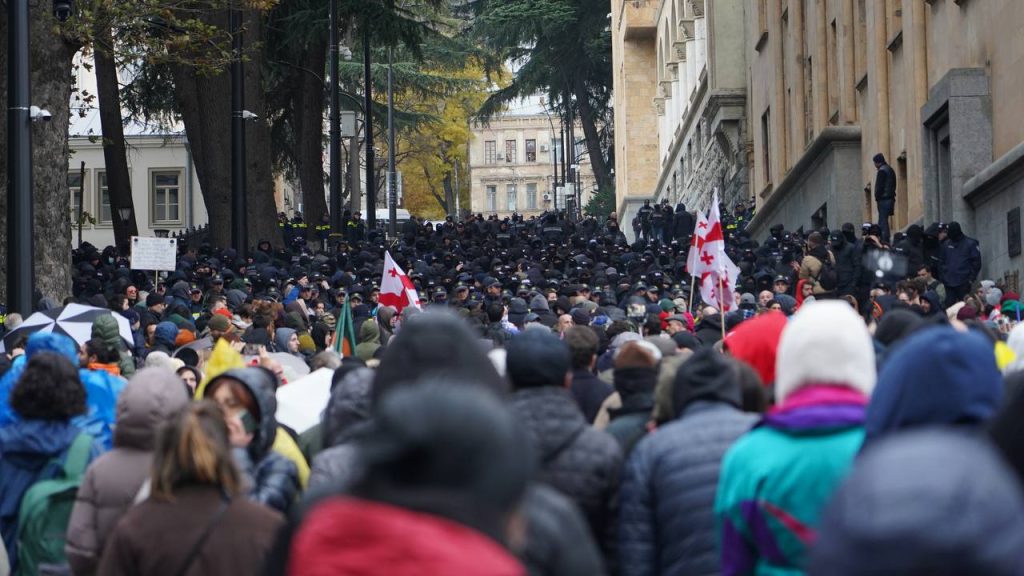Georgia’s parliament convenes for first session amid mass protests, opposition boycott
Protests surround Georgia’s first parliament session
On November 25, the first session of Georgia‘s new parliament took place under extreme circumstances, attended solely by deputies from the ruling Georgian Dream party. The opposition, the president, and much of the public have denounced the October 26 parliamentary elections as fraudulent and refused to recognize the new parliament’s legitimacy.
None of the four opposition parties that secured seats participated in the session. Outside the parliament building, a mass protest demanding new elections has been ongoing since the previous evening, drawing thousands.
Western partners and international observer missions have not endorsed the election results, instead calling for an investigation into the numerous violations reported by observers and journalists. Hungary remains the only Western country to have recognized the elections as legitimate. Western partners have also suggested an international investigation into the reported irregularities, but Georgia’s authorities have yet to agree.
Meanwhile, Georgian Dream, which officially claimed nearly 54% of the vote (89 out of 150 parliamentary seats), has replaced three ministers in the new government.

Deputies from the ruling party were escorted to the first session through special entrances under heavy police protection, as thousands of protesters surrounded the parliament building.
Some of the protesters camped overnight in tents near the parliament. They aim to send a clear and visible message to Georgian Dream that the elections were illegitimate, and consequently, so is the new parliament.
The parliament and the entire government district in central Tbilisi are encircled by extensive police cordons, including regular officers and special forces. Water cannon vehicles are also stationed near the parliament.

Several legal experts argue that today’s session violates the Constitution on at least two counts:
- According to the Constitution, the first session must be opened by the President of Georgia. However, Salome Zourabichvili refused to do so, aligning herself with claims that the elections were rigged.
- Additionally, the President and opposition deputies have filed a lawsuit with the Constitutional Court challenging the legitimacy of all 150 newly elected MPs. The Constitution stipulates that parliament cannot convene until the court has issued a ruling on such cases.
This inaugural session is also notable for the absence of representatives from embassies and Western partner organizations—a tradition upheld since Georgia’s independence. Georgian Dream announced it was discontinuing this custom.
Lineup of new cabinet announced by ruling party:
Prime Minister Irakli Kobakhidze, who remains in office, has announced the new cabinet lineup, which will require a vote of confidence from the newly elected parliament. The reshuffle includes three changes:
- Maka Bochorishvili will lead the Ministry of Foreign Affairs.
- Anri Okhanashvili will take on the role of Minister of Justice.
- Davit Songulashvili will head the Ministry of Environmental Protection and Agriculture.
Kobakhidze noted that the outgoing ministers—Rati Bregadze, Ilia Darchiashvili, and Otar Shamugia—will “take up high-ranking political posts.”
The remaining ministers will retain their positions:
- Deputy Prime Minister and Minister of Economy and Sustainable Development: Levan Davitashvili
- Minister of Finance: Lasha Khutsishvili
- Minister of Regional Development and Infrastructure: Irakli Karseladze
- Minister of Defence: Irakli Chikovani
- Minister of Internal Affairs: Vakhtang Gomelauri
- Minister of Education, Science, and Youth: Aleksandre Tsuladze
- Minister of Migration, Labour, Health, and Social Protection: Mikheil Sardjveladze
- State Minister for Reconciliation and Civic Equality: Tea Akhvlediani
- Minister of Culture and Sports: Tinatin Rukhadze
Protests surround Georgia’s first parliament session



















